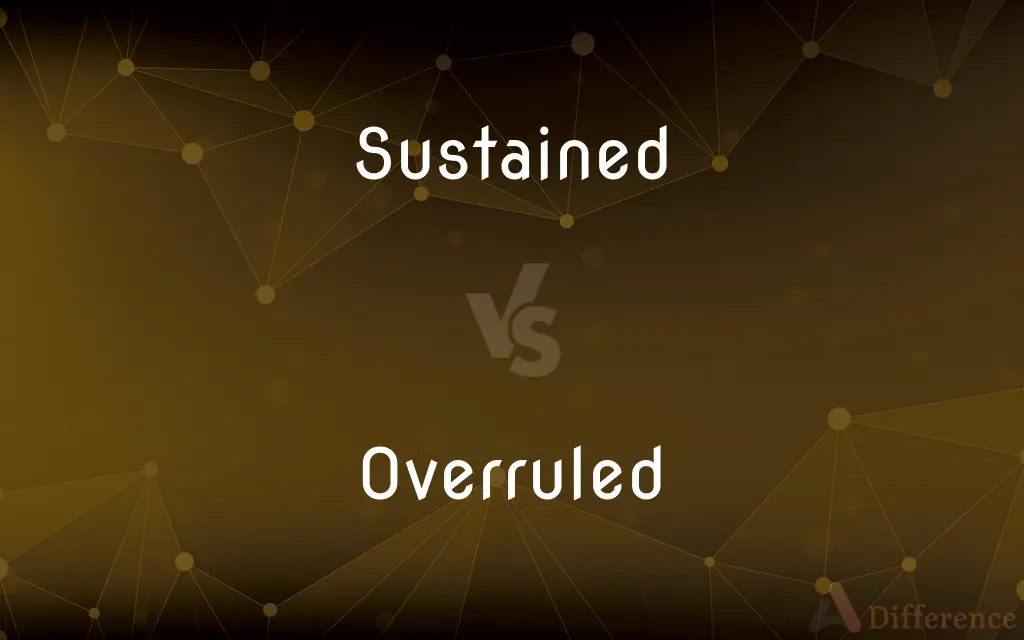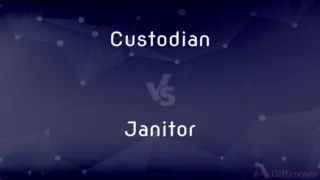Sustained vs. Overruled — What's the Difference?
By Tayyaba Rehman — Updated on May 9, 2024
"Sustained" means an objection is supported in court; "overruled" means it's rejected.

Difference Between Sustained and Overruled
Table of Contents
ADVERTISEMENT
Key Differences
In legal contexts, when a lawyer raises an objection, the judge might respond with either "sustained" or "overruled." When the judge says "sustained," it indicates agreement with the objection. This means that the questioning lawyer must change their line of inquiry or that the evidence at issue will not be admitted. On the contrary, if the judge says "overruled," it means disagreement with the objection. In this situation, the questioning continues as it was, or the evidence is admitted into the record. Essentially, when an objection is overruled, it's like the objection was never made in the first place.
Both "sustained" and "overruled" are critical terms in the court, guiding the flow of proceedings. These terms maintain the balance between the rights of both parties while ensuring the trial remains fair and just. Without these terms, court procedures could become chaotic, with lawyers potentially leading witnesses or presenting inadmissible evidence.
Another interesting point to note is the impact these rulings have on the jury. When an objection is "sustained," the jury is typically instructed to disregard the last statement or question. However, when an objection is "overruled," the jury can consider the evidence or testimony as part of their deliberations.
Both terms are strictly responses to objections and don't reflect the judge's opinion on the case's overall merits. They only pertain to specific points or evidence raised during the trial.
Comparison Chart
Meaning in Court
Objection is supported
Objection is rejected
ADVERTISEMENT
Result
Change of inquiry or evidence is not admitted
Questioning continues or evidence is admitted
Impact on Jury
Jury disregards the statement/question
Jury considers the evidence or testimony
Reflection of Judge's View
Agrees with the objection
Disagrees with the objection
Relative Position
Supports the objecting attorney
Supports the questioning attorney
Compare with Definitions
Sustained
Supported or upheld, especially in a court setting.
The judge sustained the objection, so the evidence was excluded.
Overruled
Decided against a previous decision or rule.
The new legislation overruled the old policies.
Sustained
Held continuously at a certain level.
Overruled
To declare (a court ruling or other precedent) as superseded and no longer accurate with regard to a legal question
In Brown v. Board of Education, the Supreme Court overruled Plessy v. Ferguson.
Sustained
Strengthened or supported physically or mentally.
The patient was sustained by fluids during the fast.
Overruled
Made ineffective by a higher authority.
The federal law overruled the state mandate.
Sustained
Kept at a certain level or rate.
Economic growth has been sustained for several years.
Overruled
Dominated or overshadowed.
His fear overruled his desire to participate.
Sustained
Undergone or suffered, especially without giving in.
The old bridge has sustained much wear over the decades.
Overruled
Exerted influence to change a decision.
The principal overruled the teacher's decision about the trip.
Sustained
(music) Held at a certain pitch.
Overruled
Simple past tense and past participle of overrule
Sustained
Maintained at length without interruption or weakening;
Sustained flight
Overruled
Rejected or dismissed, especially in a legal context.
The judge overruled the objection, allowing the evidence.
Sustained
Confirmed or ratified.
The initial findings were sustained after a thorough review.
Overruled
To reject or disallow as contrary to rules or law
The defense attorney's objection was overruled by the judge.
Sustained
Simple past tense and past participle of sustain
Overruled
To reject or annul (a decision or recommendation, for example)
Overrule a decision about hiring a job candidate.
Overrule a call by an umpire.
Sustained
Held up to a certain pitch, degree, or level; uniform; as, sustained pasion; a sustained style of writing; a sustained note in music.
Overruled
To reject or annul a decision made by (someone)
Overrule an umpire.
Sustained
(of an electric arc) continuous;
Heat transfer to the anode in free burning arcs
Common Curiosities
Can a decision to sustain or overrule be appealed?
Yes, these decisions can be grounds for appeal if they significantly affect the case outcome.
And if a judge says "overruled"?
It means the judge disagrees with the objection.
Are "sustained" and "overruled" used outside court settings?
Primarily they're legal terms, but they can be used metaphorically in other contexts.
What does it mean when a judge says "sustained"?
It means the judge agrees with the objection raised.
Can a judge change their mind after saying "sustained" or "overruled"?
Typically, a judge sticks to their decision unless presented with compelling reasons.
Why are these terms important in a trial?
They guide proceedings, ensuring fairness and adherence to legal rules.
If an objection is sustained, can the questioning attorney try a different approach?
Yes, they can rephrase or ask different questions.
Does "overruled" mean the judge thinks the objection was unnecessary?
It means the judge disagrees with the objection's basis, not necessarily its relevance.
Can these terms impact a trial's outcome?
Yes, decisions on objections can influence what evidence the jury considers.
Is the jury always informed about what "sustained" and "overruled" mean?
Usually, juries receive instructions on legal terms and procedures.
Share Your Discovery

Previous Comparison
Uncapitalize vs. Decapitalize
Next Comparison
Custodian vs. JanitorAuthor Spotlight
Written by
Tayyaba RehmanTayyaba Rehman is a distinguished writer, currently serving as a primary contributor to askdifference.com. As a researcher in semantics and etymology, Tayyaba's passion for the complexity of languages and their distinctions has found a perfect home on the platform. Tayyaba delves into the intricacies of language, distinguishing between commonly confused words and phrases, thereby providing clarity for readers worldwide.














































